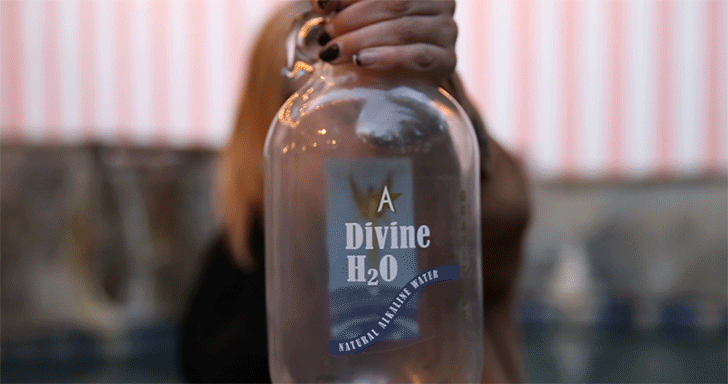
27 February, 2015
10 November, 2021
Another day, another trendy water. Right, guys?
Let’s face it, these days regular ‘ol tap water just doesn’t cut it. Take, for example, our collective coconut water obsession and the fact that the aisles at Whole Foods are stalked with endless superfood-infused water—all claiming to boast an array of nutritional benefits.
The latest water-based health drink, alkaline water, claims to balance out your body's pH level (there’s a whole diet around it too, but we’ll get to that another time), is said to be ultra-hydrating, helps flush toxins and promotes all around good health. But what actually is it? Alkaline water is just H2O with added magnesium and calcium—minerals that are easily absorbed into the body (hence the whole rehydration thing). We mean, Ashley Benson did tell us it was the best hangover cure out there, so there must be something to it, right?
Let’s face it, these days regular ‘ol tap water just doesn’t cut it. Take, for example, our collective coconut water obsession and the fact that the aisles at Whole Foods are stalked with endless superfood-infused water—all claiming to boast an array of nutritional benefits.
The latest water-based health drink, alkaline water, claims to balance out your body's pH level (there’s a whole diet around it too, but we’ll get to that another time), is said to be ultra-hydrating, helps flush toxins and promotes all around good health. But what actually is it? Alkaline water is just H2O with added magnesium and calcium—minerals that are easily absorbed into the body (hence the whole rehydration thing). We mean, Ashley Benson did tell us it was the best hangover cure out there, so there must be something to it, right?
We mean, Ashley Benson did tell us it was the best hangover cure so there must be something to it, right?
Well here’s the thing, guys, there's not all that much out there to prove that there are actual perks to drinking alkaline water and as trendy as it might be, it's still quite the controversial topic in the health world. So we asked real professionals—a doctor and a nutritionist—whether or not we should be buying into it.
Marissa Lippert
Founder, Nourish Kitchen + Table
On the alkaline water claims...
"There’s a lot of talk around drinking alkaline water— whether it’s from a metabolic or metabolism standpoint, weight loss, or for its immunity-boosting benefits. Then you have articles that mention the possibility that it could help neutralize free radicals and promote antioxidant, which benefit cancer and disease prevention. But at the end of the day, the evidence is still not significant."
On how alkaline hydrates...
"Evidence is still not clear on whether alkaline water does a better job at rehydrating your body than tap water. I would recommend drinking a litre to two litres of water a day and eating loads of fruits and vegetables with high water content. Veggies and fruits should take up 50% or more of what you eat every day."
On what foods create more acidity...
"Our bodies process animal protiens in a way that can produce more acid. The more our bodies work to break those down, the more our kidneys work and in turn produce acid. Whereas having the majority of your diet focused more naturally alkalized foods like fruits, vegetables and whole grains. It goes back to to the theory that we don’t need much animal protein in our diets. We know if you have a lot it can tax your kidneys, because they are working through a lot of toxins."
"There’s a lot of talk around drinking alkaline water— whether it’s from a metabolic or metabolism standpoint, weight loss, or for its immunity-boosting benefits. Then you have articles that mention the possibility that it could help neutralize free radicals and promote antioxidant, which benefit cancer and disease prevention. But at the end of the day, the evidence is still not significant."
On how alkaline hydrates...
"Evidence is still not clear on whether alkaline water does a better job at rehydrating your body than tap water. I would recommend drinking a litre to two litres of water a day and eating loads of fruits and vegetables with high water content. Veggies and fruits should take up 50% or more of what you eat every day."
On what foods create more acidity...
"Our bodies process animal protiens in a way that can produce more acid. The more our bodies work to break those down, the more our kidneys work and in turn produce acid. Whereas having the majority of your diet focused more naturally alkalized foods like fruits, vegetables and whole grains. It goes back to to the theory that we don’t need much animal protein in our diets. We know if you have a lot it can tax your kidneys, because they are working through a lot of toxins."
Dr. David Colbert
Author of The High School Reunion Diet
Founder of ColbertMD Skincare: Daily Nutrition for Skin
On how diets affect our pH levels...
"Much of the american diet is very acidic. Despite this fact our blood and kidneys still manage to maintain optimal pH, except in more extreme cases such as in kidney failure or severe dehydration. A person in good health will always maintain their pH at around 7.5, regardless of their diet."
On whether alkaline water is the best way to balance pH…“Our bodies have a built in pH balancing mechanism. Alkaline water itself is not sufficient in balancing your pH level. It really depends on a variety of factors in the complex interplay between the bloodstream and kidneys. Our bodies are able to maintain a pH of 7.5— this is slightly alkaline. Most biologic systems operate optimally in the human body at this pH. However, there is no scientific proof that alkaline diets or liquids have long-term health benefits.”
On how to reach optimal health...
"Avoid junk foods and high fructose corn syrup, which is a stealth sugar that packs on the pounds. Stay hydrated. Eat plenty of green leafy vegetables and fruits and consume adequate proteins to maintain muscle mass."
"Much of the american diet is very acidic. Despite this fact our blood and kidneys still manage to maintain optimal pH, except in more extreme cases such as in kidney failure or severe dehydration. A person in good health will always maintain their pH at around 7.5, regardless of their diet."
On whether alkaline water is the best way to balance pH…“Our bodies have a built in pH balancing mechanism. Alkaline water itself is not sufficient in balancing your pH level. It really depends on a variety of factors in the complex interplay between the bloodstream and kidneys. Our bodies are able to maintain a pH of 7.5— this is slightly alkaline. Most biologic systems operate optimally in the human body at this pH. However, there is no scientific proof that alkaline diets or liquids have long-term health benefits.”
On how to reach optimal health...
"Avoid junk foods and high fructose corn syrup, which is a stealth sugar that packs on the pounds. Stay hydrated. Eat plenty of green leafy vegetables and fruits and consume adequate proteins to maintain muscle mass."






